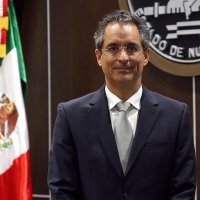New Technologies in the Administration of Justice

The COVID-19 pandemic has had a significant impact on all aspects of daily life, including the access to and administration of justice. Technological innovations such as video chat platforms have permitted judicial systems to function despite the limitations on in-person engagement during the pandemic through their use presents challenges and limitations as well. In addition, greater reliance on technology, while permitting the wheels of justice to continue to turn, may widen the “digital divide” and complicate, if not prevent, access to justice for some. Cognizant of these opportunities and challenges, Mexico Evalúa recently published the Guide to Good Practice on the Use of New Technologies for the Administration of Justice to help judicial systems in Mexico and abroad learn how to best incorporate new technologies while ensuring proper administration of justice.
The Mexico Institute, Mexico Evalúa, and the O’Neill Institute for National and Global Health Law at Georgetown University hosted a presentation of the guide followed by expert commentary on how technology has changed the administration of justice in Mexico and the United States since the start of the pandemic.
Watch the recording below.
Speaker Quotes
Laurence Pantin
“There are two main obstacles to the development of digital justice in Mexico. The first one is that some state courts did not necessarily know in detail the state of existing technologies and the requirements to develop them. The second one is that there are normative challenges to the use of some technologies in some areas of low procedural stages.”
“[The digital divide] is not an issue just for justice right now, but also for education and health... This should be a priority for governments, especially in Mexico, to really provide access and amplify the access to the internet and to technology that people can have in Mexico.”
“Two years ago... we noted that the use of technological tools was very uneven. So when the COVID-19 pandemic hit Mexico and courts started to suspend their attention to the public, we found that the state courts which were able to reopen their services more quickly were those with some advances in this field.”
Magistrate Carlos Emilio Arenas Bátiz
Magistrate Arenas Bátiz gave his remarks in Spanish. The quotations below have been translated into English.
“I think that before COVID, we already had some technological tools that assisted the access to justice and justice proceedings... Nevertheless, with COVID, the use of incorporated technologies increased notably in order to avoid the gathering of people or to allow work from a distance.”
“Three pillars have been developed that affect the fundamentals of the administration of justice. One is the subject of access to justice. The second is the subject of the effectiveness of the administration of justice. The third is the transparency of the administration of justice.”
“In our country, many families do not have computers. For example, we have seen with online classes, although children should have class on a computer, we see many families without computers use cell phones. On the cell phone, students are able to, with difficulty, continue with classes.”
Judge Marian Blank Horn
“The federal system was very well positioned to jump into remote proceedings. We had in place a fairly sophisticated electronic case filing system which allowed access, in fact, required lawyers without special permission to have to file electronically in the federal system. That system had been developed over a number of years long before COVID.”
"We have a number of goals that I think have been foremost in how we approach this. One is to have no difference in the fairness afforded to litigants in our courts and to have open access to all litigants. And of course in the criminal justice system, to continue the constitutional guarantees that a defendant has to confront the witnesses before them and to have a fair and just trial.”
“There are many state courts around the country that did suspend criminal proceedings and some that still have suspended criminal proceedings, but that can only go on so long because under our constitution you only have 120 days to get that stuff initiated.”
Speakers



Moderator

Hosted By

Mexico Institute
The Mexico Institute seeks to improve understanding, communication, and cooperation between Mexico and the United States by promoting original research, encouraging public discussion, and proposing policy options for enhancing the bilateral relationship. A binational Advisory Board, chaired by Luis Téllez and Earl Anthony Wayne, oversees the work of the Mexico Institute. Read more


